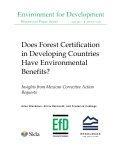Energy taxes can produce substantial environmental and revenue benefits and are an important component of countries’ fiscal systems. Although the principle that these taxes should reflect global warming, air pollution, road congestion, and other adverse environmental impacts of energy use is well established, there has been little previous work providing guidance on how countries can put this principle into practice. This book develops a practical methodology, and associated tools, to show how the major environmental damages from energy can be quantified for different countries and used to design the efficient set of energy taxes. The results, which are illustrated for more than 150 countries, suggest there is pervasive mispricing of energy across developed and developing countries alike with much at stake in policy reform. At a global level, implementing efficient energy prices would reduce carbon emissions by an estimated 23 percent and fossil-fuel air pollution deaths by 63 percent, while raising revenues (badly needed for fiscal consolidation and reducing other burdensome taxes) averaging 2.6 percent of GDP.
The report highlights the importance of building compact, more efficient cities. It proposes creating a sustainable national urban system across the country and makes recommendations to support the government’s five-year Growth and Transformation Plan.
In the face of an increasing urban population, Ethiopia can learn from the experience of other developing countries. In some developing countries too much growth was concentrated in rapidly expanding capital cities. This meant that they were later unable to keep up with their growth, having to tackle health-related problems caused by pollution and divert scarce resources to provide services such as basic housing and sanitation to a sprawling urban population.
This is the second edition of the India Fossil-Fuel Subsidy Review, a biannual publication of the International Institute for Sustainable Development’s (IISD) Global Subsidies Initiative. Part One of this edition outlines economic and policy developments affecting key fuels (diesel, liquefied petroleum gas, kerosene and natural gas), and analyzes the dynamics of each market. Part Two features analysis by guest authors on issues related to energy subsidy policy reform. Also in this edition, articles examine potential reform paths for India’s LPG subsidy system, and lessons from a pilot program for electronic transfer of kerosene subsidies.
This research investigates the profitability of biofuels production in Africa, taking Ethiopia as a case in point, and suggests an oil price threshold beyond which biofuel may be profitable. Specifically, the study analyzes the viability of bioethanol from molasses and biodiesel from other feedstock in the context of Ethiopia, using data from a biofuels investment survey by EEPFE/EDRI in 2010, and makes estimates based on field visits.

This discussion paper hypothesizes that these findings were at least partly driven by the tendency of FSC certification to attract already- sustainably managed forests and by the governance challenges of community forestry in developing countries. One implication is that policymakers using FSC certification to generate environmental benefits may want to target forests with less-than-stellar management—particularly in the case of reduced emissions from deforestation and degradation (REDD) initiatives that emphasize improvement beyond business-as-usual—and to build the community and legal institutions needed for sustainable forestry.
